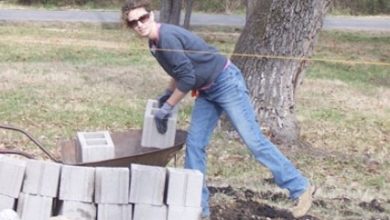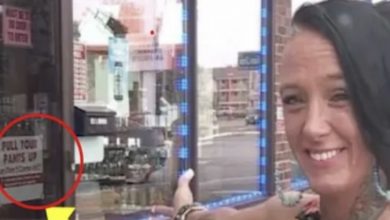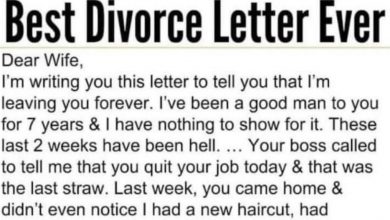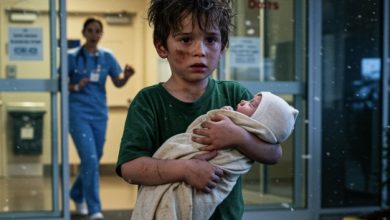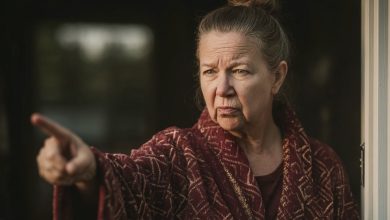“A Teen’s $3.2M App Sparked a Custody Battle—Then His Evidence Turned the Case Upside Down.”
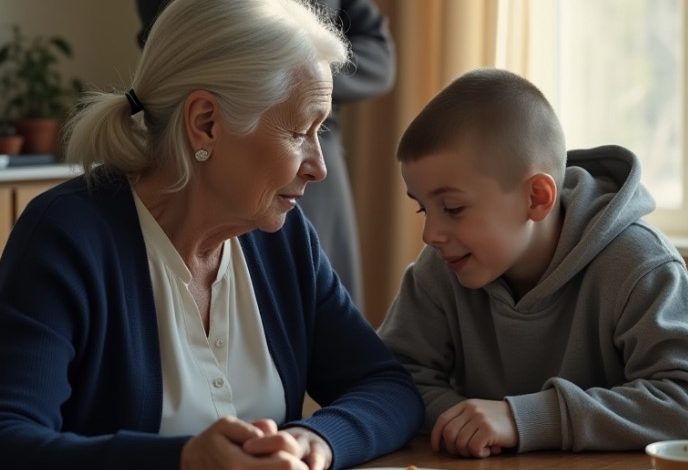
My daughter left her little boy on my porch when he was five years old and never came back. That was eleven years ago. I raised Ethan by myself. People told me again and again that he would never do well because he was autistic, because he was “too different,” because life would always be too hard. They were wrong. When he turned sixteen, he finished a program that checked if documents were real or fake, and a company bought it for 3.2 million dollars. The local news told his story. Two weeks later, the doorbell rang. My daughter, Rachel, stood there with a lawyer and a folder full of papers. She said she had been helping all along and wanted custody and control of Ethan’s money. The papers looked official. Our lawyer warned me that without proof they were forged, we could lose. I was shaking. Ethan was not. He leaned toward me and whispered, “Let her talk.”
My name is Vivien. I am sixty-eight, and this is how we got there.
Rachel had brought Ethan to me on a Friday in November 2010. He had one small backpack and kept rocking on his heels, hands pressed over his ears even though the street was quiet. “Just for the weekend, Mom,” she said, not meeting my eyes. “I need a break.” Before I could ask anything, she hurried back to her car. She did not hug him. She did not kiss him. The taillights disappeared, and I was left with a silent, frightened child who would not look at me.
I had taught elementary school for thirty-five years. I had seen autistic children in my classroom, but always with aides, with specialists, with careful plans written by teams of people. Standing in my doorway with Ethan, I understood I knew very little about what it meant to live with autism day after day. I crouched so my eyes were level with his shoulder and spoke softly. “Hi, Ethan. I’m Grandma. Let’s go inside when you’re ready.” I did not touch him. I opened the door and waited. After a while, he walked past me. Every sound startled him—the hum of the refrigerator, the click of the heater, even the soft squeak of my slippers on the kitchen floor.
That first night was hard. I tried chicken nuggets because Rachel once told me he liked them. He turned away. I tried pasta. He pushed the plate. I tried a sandwich. He slid it across the table without looking at me. He ate three plain crackers and drank water from a yellow plastic cup. When I tried to help him brush his teeth, he screamed with a raw sound that made my heart leap. I stopped at once. I tucked a blanket around him; he flung it off. I left it at the foot of the bed and stood in the doorway until he fell asleep. He hummed to himself most of the night. I did not sleep at all.
On Saturday I called Rachel. No answer. I left a message asking what Ethan ate, what his routine was, what helped him calm down. I called that night and the next day and the next week. Silence. I took him to the pediatrician. The doctor nodded kindly and said what I already knew. Ethan was autistic and needed proper evaluations. “Has anyone helped you arrange services?” she asked. “His mother was supposed to,” I said. The doctor looked at me carefully. “You’re doing it now.”
I learned by watching. He needed the same breakfast every morning: scrambled eggs and toast cut diagonally, nothing touching on the plate. He needed the same route to therapy or he would scream in the car. He needed space, not hands, when he was upset. I stopped asking for eye contact. I did not force hugs. I gave him quiet, sameness, and time. The storms slowly eased.
Two weeks after he came, I found him on the living-room floor at dawn with a bin of toy cars. He lined them up with perfect care, not just by color but by tiny changes in shade, red to orange to yellow to green, each step so small I had to squint to see it. I told him it was beautiful. He didn’t answer, but his rocking slowed.
On Christmas Eve the phone finally rang. “Rachel?” I asked. “Mom,” she said, sounding flat and tired. I told her Ethan needed her and asked when she would come. She said six words that changed everything: “I can’t do this anymore, Mom.” Then she hung up. I tried to call back. She never answered again.
I slid down to the kitchen floor with the phone in my hand. The cookie sheet in the oven burned black. Ethan appeared in the doorway, watched me, then picked up his yellow cup and set it next to me on the floor. He walked away. I cried until I could stand again. That night I decided that if his mother quit, I would not. I would give him the same thing every day: safety.
Time moved forward. With therapy and practice, Ethan began to speak more. He still preferred routine, but he started answering questions and using full sentences. He would tolerate a quick touch if he was the one to choose it. I learned to listen to the rhythm of his day. He learned that I would not push him past what he could bear.
In 2014 the school tried to move him to a special-needs room, not because he couldn’t do the work, but because he didn’t act like the other children. I asked for an IEP meeting and brought a thick folder of proof. His reading was high. His math was higher. He needed headphones for music class, extra time for transitions, and a quiet corner when the noise was too much. He did not need to be removed. I told them to offer support in his regular classroom. After much arguing, they agreed. That night at dinner he asked, “Why do they want me to be different?” I told him, “Because people get scared when someone sees the world in a new way.” He nodded and kept eating.
A year later he asked to see his birth certificate and any papers with his name on them. He scanned every document into a small tablet, sorting them into neat folders. “What are you doing?” I asked. “Building a system,” he said, “so nothing gets lost.” He began scanning school papers, therapy notes, calendars, even old receipts. He backed everything up and added little codes I didn’t understand. I thought it was his way to make sense of his life. I didn’t realize he was quietly building proof.
When Ethan turned twelve, he discovered programming. He spent that summer learning to code on my old laptop. By fall he wrote small tools that sorted files and checked if they had changed. “It’s like fingerprints,” he explained, showing me a string of numbers on the screen. “If the file changes, the fingerprint changes.” At thirteen, he turned our binders into digital records, each one stamped with time and connected to the ones before and after it. “If someone changes one link,” he explained, “the whole chain shows it.” At fourteen he went through boxes in the garage to build a timeline of our days—phone bills, bank records, calendars. He was creating a living memory that could not be edited after the fact. I thought it was therapy. It was training.
By fifteen he had put everything together into a program that checked documents for authenticity. The pandemic had started, and everyone lived online. Ethan hardly noticed the shift. He finished his program in the spring. He sold the first copy to a small security company in June. More orders came. At sixteen he asked for a business lawyer because he did not want to sign anything he didn’t understand. The lawyer, James Nakamura, sat at our kitchen table and read through three offers. Ethan decided to sell the software outright. In March he closed the sale for 3.2 million dollars. The local news interviewed him. When the reporter asked why he had created it, Ethan said, “Because I wanted to know what was real.”
Two weeks later, Rachel returned with a lawyer named Steven Walsh. She wore a fine gray suit and a polished smile. Walsh had a leather briefcase and a smooth voice. They sat at our old kitchen table, the same place where Ethan had once learned to hold a fork.
“Mrs. Cooper,” Walsh said, “we’re here to discuss custody and financial guardianship. My client has kept her parental rights and wants to resume care now that Ethan is a minor with substantial assets.” I told him Rachel had not called in eleven years. Rachel put on a soft voice and said she wanted to guide him, protect him from people who might take advantage. Walsh laid out documents with stamps and signatures: visit logs, money orders, phone records. Everything a judge would want to see. I could tell they were false, but I had no way to prove it. Ethan said we should get a lawyer, and we did. Linda Reyes studied the papers and frowned. “They look real,” she said. “Unless we can show they’re forged, a judge might give your daughter control of Ethan’s money until he turns eighteen.” The floor seemed to tilt under my feet.
The depositions began. Rachel spoke first with perfect calm. She listed fake visits, fake payments, fake calls. She knew dates and amounts because she had written them into her scripts. Walsh asked Ethan if he remembered his mother visiting. Ethan said, “I’d need to check my records.” Walsh looked satisfied, like Ethan had just admitted to a bad memory. I did not understand what Ethan was planning, and I spent the night before court staring at the ceiling. At three in the morning I saw light under Ethan’s door and heard keys clicking. “Tell the truth,” he said when I came to his room. “That’s all you have to do.” He typed until dawn.
In court Walsh presented the neat stack of “proof.” The judge, a firm woman named Judge Harrison, read the pages with care. Linda presented the binders I had built over the years and explained our life together. I could see the judge respected the work I had done, but the law cares about documents, not feelings. Without proof of fraud, Rachel still had her rights on paper. The judge looked at me and said gently that my daughter’s claim had legal weight. I felt my chest go tight. Rachel’s mouth curved at the corner. I leaned toward Ethan and whispered that we were losing. He whispered back, “Let her talk.”
Then the judge asked if Ethan wanted to speak. He stood and said, “Yes, Your Honor. I have evidence.” He carried a laptop to the witness stand and asked to connect it to the courtroom screen. Walsh objected. The judge allowed it. Ethan opened Rachel’s “records” and showed the digital fingerprints. He explained that the files were created recently, not years ago. He showed how the signatures did not match older samples of Rachel’s writing. He explained that his system checked a file’s hidden information and that the chain of proofs could not be edited without breaking. Walsh argued that metadata could be changed, but Ethan calmly showed additional checks that could not be faked in the way these were. He opened a timeline that combined my calendars, therapy notes, school logs, phone bills, and bank statements. He showed month after month with no calls, no deposits, no visits. The judge asked how a sixteen-year-old knew how to do all of this. Ethan said he had built the system over seven years and had sold it to Anderson Security last month. The judge asked if that sale was real. Ethan gave the company name and price. She had seen the news story herself.
The judge turned back to Rachel. “Do you have any proof that you visited your son or sent money?” Rachel stammered and tried to blame mistakes on the files. Then she slipped and said, “My lawyer said—” and stopped. The judge’s face went cold. She ruled right then from the bench. She found Rachel’s documents not credible and awarded full custody and guardianship to me. She also referred the matter to the district attorney for possible charges. The gavel came down. Rachel looked like the air had been knocked out of her. Ethan took my hand, and I realized he had been preparing for this moment since he was nine years old.
After the case, life settled into a new rhythm. Ethan started a small company to test software and hired people who saw patterns like he did. “I’m hiring autistic adults first,” he said. “We notice details other people miss.” He asked me for names of former students who might be interested. He interviewed them himself, using clear questions and giving extra time when they needed it. His first three hires were Steven, Marcus, and Lily, children I had taught long ago who now had a chance to shine. They worked carefully and well. When a client tried to rush them, Ethan said no. He protected his team the way I had protected him.
Rachel received probation and community service at an autism center. Months later I delivered donated supplies there and saw her on the floor reading to non-verbal children. She looked worn out and smaller somehow. Our eyes met. We said nothing. I left quickly. Some bridges cannot be rebuilt, and that is all right.
On a quiet Tuesday evening, I brought dinner to Ethan’s small apartment. He still kept the old yellow cup on his kitchen shelf, chipped now but safe in its spot. We ate simple food at his table. He told me about a bug his team had found in a client’s app and how they’d solved it together. When I stood to wash the dishes, he said my name softly. I turned. He was looking at his hands, then at me. “I know what you gave up,” he said. “You could have sent me somewhere else. You didn’t.” My throat hurt in the best way. “You’re my grandson,” I said. “I chose you every day.” He nodded, and for a moment he let me kiss the top of his head. He did not pull away.
Driving home, my phone buzzed at a red light. A text from Ethan: “Thank you.” Just that. I smiled all the way to my house.
People ask me now how he did it, how a boy everyone called “too difficult” built something worth millions. The truth is simple. He did it the same way he lines up toy cars or organizes a shelf or solves a problem. He pays attention. He builds systems so lies have no place to hide. He is not interested in being what others want. He is interested in what is real.
When I think back to the day Rachel returned with her papers and her lawyer, I still feel that wave of fear. But then I remember the way Ethan leaned toward me and whispered, “Just let her talk.” He knew the truth would stand. He trusted the record he had built and the quiet work we had done for years. I thought I had been teaching him. It turns out he had been teaching me too—that love is steady, that proof matters, and that peace often speaks in a soft voice.
I still keep his yellow cup washed and ready when he visits. I still cut the toast corner to corner when he asks, even though he now eats many other things. On Saturday mornings we sometimes sit on the porch together without saying much. He watches the light change across the yard. I think of the boy who once hummed in the dark and the young man who stood before a judge with clear eyes. When he leaves, he always says, “Tuesday?” I answer, “Tuesday,” and mean it with all my heart.
We did not win because a judge liked us more. We won because Ethan told the truth and proved it. Rachel tried to rewrite the past. Ethan wrote it down as it happened and kept it safe. That is his gift. That is his armor. And that is why, when the moment came, he could lean over and say in a calm voice, “Let her talk,” and mean, “Let the truth show itself.”

